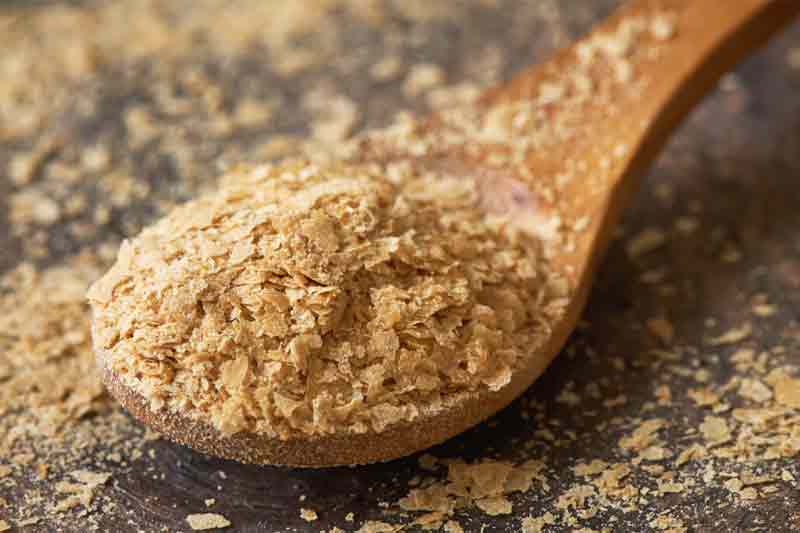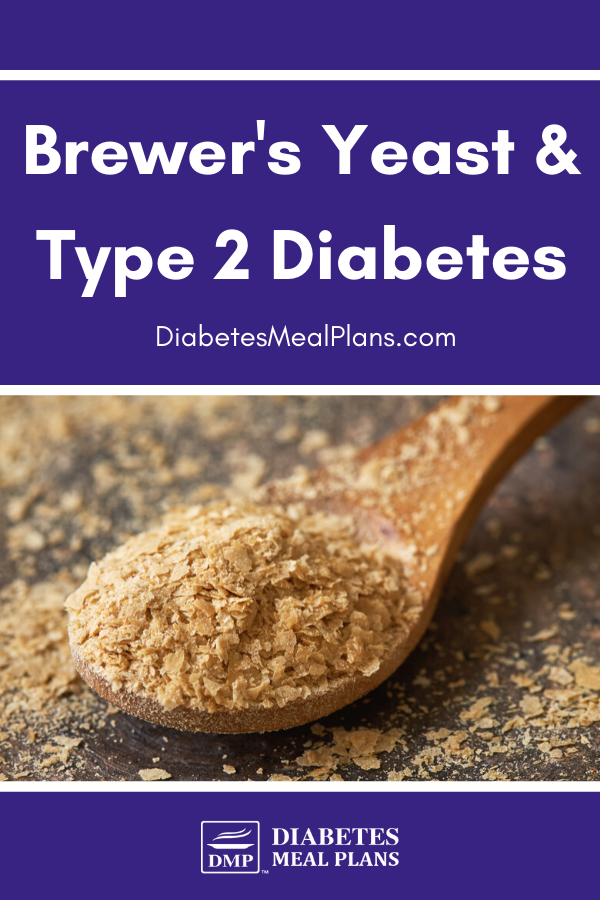When you think about yeast, the concept of bread-making probably comes to mind.
But, baker’s yeast isn’t the only kind of yeast out there that has a job to do.
Brewer’s yeast (a potent probiotic) can be used as a supplement that may treat high blood sugar levels in people with diabetes.

What is Brewer’s Yeast?
Brewer’s yeast is made from a one-celled fungus called Saccharomyces cerevisiae. Traditionally, brewer’s yeast is a byproduct of making beer but it can also be grown and used a dietary supplement.
Since brewer’s yeast has the attributes of a probiotic, it is often used to help treat digestive dysfunction such as diarrhea – it can be especially helpful those suffering from diarrhea related to antibiotic use and Clostridium difficile infection.
Probiotics are foods or dietary supplements that contain organisms, like bacteria or yeast, which provide health benefits for humans. Adding probiotics to your diet or supplement routine can help diversify gut bacteria and potentially boost your gut health.
Other benefits of brewers yeast have also been studied including lowering blood glucose levels, which is helpful for managing diabetes, and boosting immunity.
Brewer’s Yeast Nutrition Facts
Brewer’s yeast is a very nutrient dense food. A “nutrient dense” food contains quality nutrition with a variety of vitamins and minerals.
Two tablespoons of brewer’s yeast contains 100 calories, 13 grams of protein, 13 grams of carbohydrates, and 6 grams of fiber.
Brewer’s yeast is a great source of:
- Selenium
- Riboflavin
- Thiamine
- Niacin
- Copper
- Vitamin B6
- Chromium
- Potassium
- Folate
That is a nice variety of B vitamins and minerals!
Although brewer’s yeast is a source of B vitamins, it does not contain vitamin B12. Inadequate amounts of B12 impact blood glucose levels, so it’s important to make sure you have sources of B12 in your diet.
Don’t confuse brewer’s yeast with nutritional yeast. Although both come from the Saccharomyces cerevisiae species, they are very different products.
Nutritional yeast is grown specifically as a food product and grown on a source such as blackstrap molasses, sugar beets, and whey. Unlike brewer’s yeast, nutritional yeast does contain vitamin B 12.
Brewer’s yeast is a by-product of the beer making process and grown on hops.
How to Use Brewer’s Yeast
The great thing about brewer’s yeast is that it is very easy and convenient to add to your diet.
Capsules can provide you with a concentrated dose which can either be swallowed or broken apart and mixed into smoothies, soups, or sauces. It can also be purchased in powder form.
The standard serving size is two tablespoons, which can be eaten all at one time or split up however you like.
There are no established guidelines on the appropriate dosage of brewer’s yeast but most products contain between 250mg-1,000mg depending on whether it is in powder or capsule form.
Daily consumption up to 3,000 mg per day is considered safe for short term use.
Make sure to find brands that do not contain any fillers and or additional ingredients. And if you are following a gluten free diet you want to read labels carefully as some brands of brewer’s yeast contain gluten.
Be aware that brewer’s yeast does contain some carbohydrates, so you still want to monitor how much you’re consuming. Depending on what else you are consuming with the brewer’s yeast, you may have to make some adjustments to your meals or snacks to stay within your daily carbohydrate goal.
If you decide to take brewer’s yeast to help with blood sugar control, make sure to start with a low dose and work your way up gradually while also checking blood sugar levels to help prevent hypoglycemic episodes.

Research on Brewer’s Yeast and Diabetes
Incorporating a few scoops of brewer’s yeast into your diet could help balance your blood sugar levels.
In one study, 84 adults with diabetes received either brewer’s yeast or a placebo for 12 weeks. Those receiving the brewer’s yeast were found to have significantly lower blood sugar levels and glycosylated hemoglobin (A1c) along with improved insulin sensitivity compared to the placebo.
The benefits of brewer’s yeast on blood sugar may be due to its chromium content. Chromium is a trace mineral that has been shown to improve insulin sensitivity and boost blood sugar control in those with diabetes.
In 1957, a compound in brewer’s yeast was found to prevent an age-related decline in rats’ ability to maintain normal levels of glucose in their blood. Chromium was identified as the active ingredient in this so-called “glucose tolerance factor” in 1959.
In a much more recent study (2011) that compared brewer’s yeast with and without chromium, individuals receiving the chromium-enriched brewer’s yeast had significantly reduced fasting blood glucose and improved glycosylated hemoglobin (A1c). Cholesterol, triglycerides, and LDL cholesterol were also improved with those receiving the brewer’s yeast with chromium, so chromium seems to be the magic nutrient that makes brewer’s yeast effective.
In older individuals, where chromium intake is often already poor, brewer’s yeast has been shown to improve glucose tolerance along with positive effects on serum cholesterol.
What Are The Side Effects of Brewer’s Yeast?
Brewer’s yeast is generally considered safe for short-term use. In some people, brewer’s yeast may cause migraine-like headaches, upset stomach, and gas.
As always, you should speak with your healthcare provider before taking any supplements. Brewer’s yeast can interact with certain medications:
- Monoamine Oxidase Inhibitors (MAOIs): This type of medication is used for treating depression. The large amount of tyramine in brewer’s yeast can cause severe high blood pressure when mixed with MAOIs.
- Meperidine: A hypertensive crisis can occur when brewer’s yeast interacts with this pain medicine.
- Diabetes medications: Brewer’s yeast may lower blood sugar levels. Taking it in combination with diabetes medications can place you at higher risk for low blood sugar.
Those suffering with inflammatory bowel disease such as Crohn’s disease and Ulcerative Colitis, may want to avoid brewer’s yeast as it may make symptoms worse.
Because there is a lack of clinical evidence regarding the safety of using brewer’s yeast during pregnancy or breastfeeding, it is not recommended. However, many sing the praises of brewer’s yeast for helping to increase a nursing mother’s milk supply when consumed regularly.
Conclusion
Overall, brewer’s yeast has the potential to help decrease blood glucose in type 2 diabetics. The chromium content of brewer’s yeast is likely the reason for these improved numbers.
Brewer’s yeast has other potential benefits including treating diarrhea and boosting immune function.
Two tablespoons per day can provide a nice variety of B vitamins and minerals such as selenium and chromium. It can easily be taken as a capsule or powder too.
Both forms of brewer’s yeast can be mixed into smoothies and baked goods.

Leave a Reply